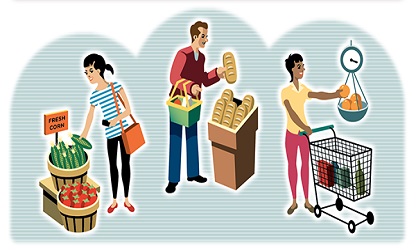 Is consumerism consuming the consumer?
Is consumerism consuming the consumer?“I am in deep trouble,” Smitha was lamenting. “I had taken a bank loan with a substantial interest to buy an apartment. Now, the instalments are due for a couple of months. My sources of income are blocked. My credit profile is abysmally low.”
“But you had your own house. Isn’t it?” quipped her friend. “Yes, I do have. It is a joint property. So, I thought I must own something and hence purchased this costly apartment, because bank officials were calling me day in and day out saying they will give me the loan”
Well, Smitha is not alone. There are several hundreds like her who yielded to temptations, consumerism and expansionism without adequate consideration of their current status, emerging risks and future needs. Investments are good, but unplanned investments without proper understanding of the risks involved might lead one to distress.
The question arises: whether consumerism is consuming the consumer? It appears so.

From a world where the practice of minimalism helped people to live a contented life, we have moved on to the expansionist trends. We tend to buy things for the following reasons:
There could be several other reasons.
It is important to understand that the speed of production is almost double the speed of consumption. Hence the market dynamics will operate with a wide spectrum of provocations to sell the products at an unreasonable speed. Playing with the instincts of the people and creating a need for the products and services is a part of their professional game plan. Hence the buyer must exercise intelligence and wisdom to rationally evaluate the need, the suitability, the risks, the relevance of these products and services.
We are in a world of compulsive consumerism with the media marketing products aggressively 24x7 with promises unlimited to make one’s life comfortable and happy. There is neither evidence nor any guarantee that they will provide the happiness sought for. The consumer yields to provocations and temptations as their dopamine levels shoot with the visuals and audios. The interplay of hormones drives the buyer to make a compulsive purchase with the product which might find no use even within a brief time. “The folly of endless consumerism sends us on a wild goose-chase for happiness through materialism,” says Bryant H. McGill, the American author.
The chaos created by covid did bring a psychological impact on the consumers who questioned ‘what do I do with all these things?” and “Why should I buy anything further when I don’t need them?” But the human desire to seek gratification and happiness reversed the trend with the fear of covid slowly withdrawing. “We live in an era of consumerism and it's all about desire-based consumerism and it has nothing to do with things we actually need”., says Aloe Blac, the American musician.
Alongside compulsive consumerism, we also yield to competitive consumerism. We tend to buy things because others have. We want to show that we are in no way inferior. Competitive consumerism leads to greed, avarice, aggression, violence, depression and other self-defeating emotions if one doesn’t graduate through it. Oftentimes, in competitive consumerism, people surpass the limits of their capabilities, resource constraints and the risk management limits.
In either case, the consumerist trends play with the psychological and emotional profile of the consumer negating the exercise of wisdom, rationale and contextuality. Slowly and steadily, with a credit card in the pocket and the loan facilities with multiple banking services, the individual drowns in an ocean of debt. “We no longer live life.” says Vicki Robin, the noted author. With digital marketing in play, the reach, the speed and the details of products and services is so fast, vast and penetrating that the consumer suffers both from compulsive and competitive buying urge.
The patterns of consumerism have already impacted significantly the living styles, attitudes, relationship patterns and the social architecture. One wonders how this would impact the younger generation who are not only witnesses but participants in this pursuit. Though no one would undermine the emergence of new products and services for growth and satiation of human needs, consumers need to be educated adequately to make the right and informed choice. The consumer needs to be educated that possession and use of materials and services are not necessarily meaningfully linked to happiness, which is the most desirable mental state.
The role of education in preparing the consumer cannot be underestimated. Care needs to be taken to ensure that the consumer is not consumed in this rat race.
भोगा न भुक्ता वयमेव भुक्ताः says Vairagya Shatakam meaning "Desires were not devoured but we ourselves were devoured"